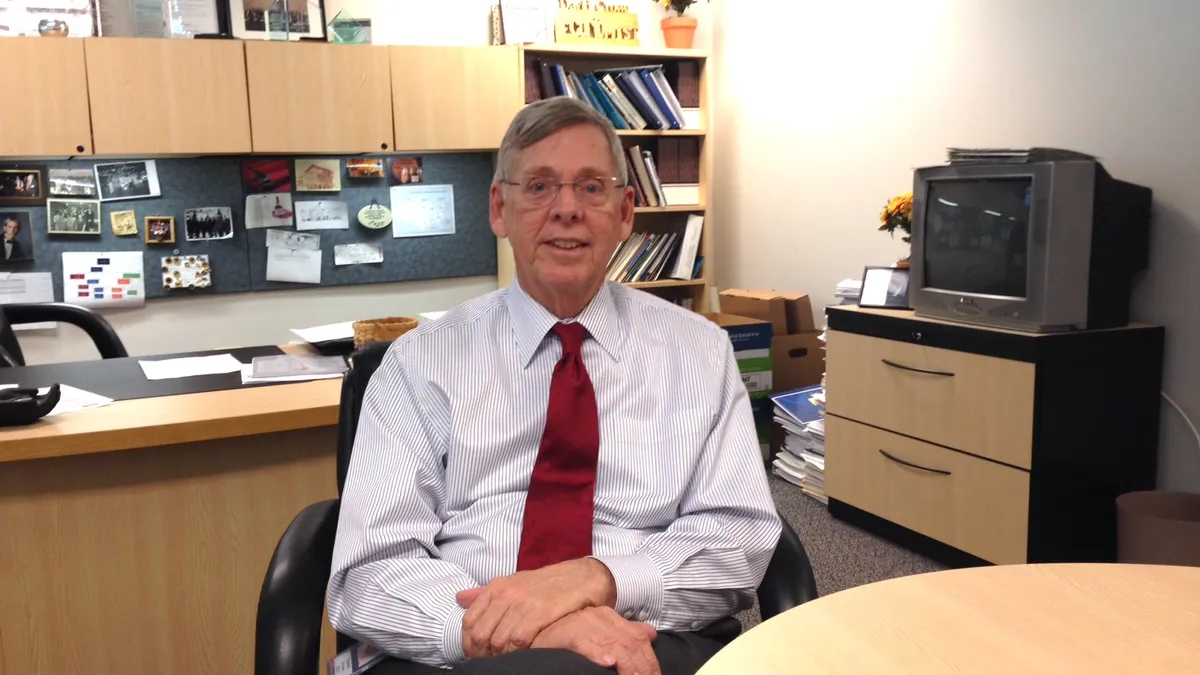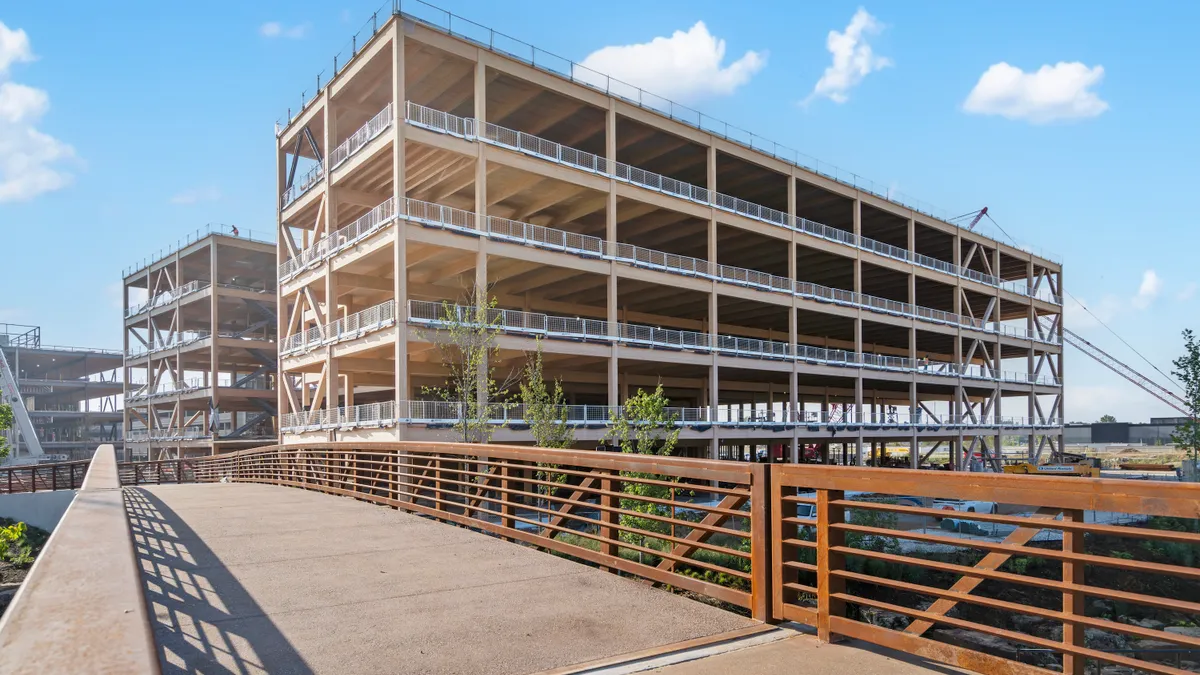After 13 years with the U.S. Department of Housing and Urban Development as a policy analyst and 27 years as an economist with the National Association of Home Builders, David Crowe has seen his fair share of ups and downs in the housing market. Now, he is retiring as the NAHB's chief economist and handing the reins over to Robert Dietz, the association's current VP of tax and market analysis, on March 18.
Crowe said that after eight years as the chief economist, he plans to use his newfound free time to check off some of his "bucket list" items and focus on the outdoors, his woodworking hobby, and spending time with his grandsons.
And although he is leaving what he called "the best job anybody could ever hope for," Crowe said he has nothing but confidence in Dietz as his replacement. "He’ll do fine," Crowe said. "He’s a smart guy, he’s got a very good grounding in economics, and people know him."
We caught up with Crowe to get his take on the current housing market, to learn about some of the most memorable points of his career, and to find out what advice he would offer homebuilders in the evolving residential industry.
CONSTRUCTION DIVE: How has your time at the NAHB changed, and how have you seen it transform?
CROWE: We’re a lot more focused on what we do. Not that we were ever unfocused, but we really have pinpoint focus on our issues now. We have people that are very specialized in the policy areas that we care about. That’s not only in the lobbyist/regulatory/analyst arena, but also the equal analyst. That sort of very specific, very honed skill so that we can be better at answering the massive array of policy issues we cover and information and data issues.
How did you get into housing economics in the first place?
CROWE: I actually went to HUD with a specialty in urban economics. People forget, but the U in HUD is urban. That’s what my dissertation was in. It was clear that the department was much more focused on the housing rather than the urban side of it. Also, housing was just more interesting than the urban issues. So it was a matter of relearning or expanding what I learned in graduate school to learn the housing component of the H. That led to being more well-equipped to join the NAHB.
During all your time at HUD and at the NAHB, what were some of the most memorable events of your career?
CROWE: Well we started off right away at HUD with a new home tax credit. So in 1975, we were at the tail end of a recession, and there was a huge inventory of new houses for sale, and therefore no reason to build new ones because there was an inventory of new homes on the market that couldn’t be sold. And the government realized that if we are to get the economy going again, we need to get homebuilding going again. To get homebuilding going again, we need to get rid of the inventory. So they gave a tax credit if you bought a new home that was already built. One of my first jobs was to figure that out, what kind of an impact did that have. In an interesting way I followed that through, because we had a homebuyer tax credit in this crash. So that experience and understanding how that worked, analyzing it, having the history behind what did happen was useful when I came here to help our lobbyists help those that wanted to propose it, to give them sense of what was the likely outcome, what was the history.
And the most memorable thing of course is this most recent crash, which was really as bad as virtually anyone who’s alive today has ever seen. Even if you go all the way back to the Depression of the 1930s, in the case of housing, it was probably as bad. We really can say that was the worst in anybody’s lifetime. So that required a whole new set of skills. What do we do policy-wise to propose that might help, what do we do member-wise to try to help members get themselves through this, and what do we do organizational-wise to weather it and come out stronger than we were when we started? So those were pretty big challenges. And during most of that time I was the chief economist and I was much more intimately involved in every crisis and every turn.
What was the atmosphere like at the association when the housing crash happened?
CROWE: First of all, it was late here because the membership doesn’t fall off immediately. You pay your dues for a year, so you don’t leave. Our membership and our convention and all the revenue sources for the organization didn’t fall away until, say, '09, when we really started feeling the pain. Then it was just a series of contractions, basically hunkering down and doing what you needed to do with what you had. We of course laid off some people, offered early retirement, did all kinds of things to make it as painless as possible. But it was a tough time, you can’t hide that.
Is there more of a sense of optimism now?
CROWE: A lot more, a lot more. Just getting through IBS this year made a big difference. It’s the best one in the recovery period. Not just in the absolute numbers of attendance and sales, but you could just feel a better vibe, not just among the staff but among the attendees. There's just a renewed vigor out there.
How has homebuilding changed in your time here? Do you think there are different challenges builders are facing?
CROWE: Yes and no. They still build houses the way they always built them. Because it’s such a fractured industry, really thousands of small companies and very few very large companies, technological change is pretty slow. Product technological change is a little bit faster, so product manufacturers, window, heating and air conditioning systems — those things have advanced over my experience. But you still build a house with two-by-fours, you still pour concrete slab or concrete foundation, you still do an awful lot of work onsite. Maybe a little bit more of it is done in a factory that comes out prepared — window systems are all in one piece, cabinets are made offsite. But for the most part, it’s all the same.
I think where the challenge has become is this NIMBY-ism and the no growth flavor. That’s clearly intensified. Communities are a lot more able to organize themselves when they don’t want something. It sort of makes the homebuilding organizations more important to the individual builder because we can fight our battles as unified instead of the individuals. I noticed that even when I started working here. There was a phrase for a while called smart growth. There were also phrases for no growth and stop growth, so we in the industry invented a phrase called smart growth. Growth isn’t bad just as long as it’s smart. It had a nice ring to it, and it intended to say if you want to have more people living there, if you want to have more jobs in your community, then you have to have more houses. It’s kind of tit for tat.
What are your predictions for the future of the housing market? Are you optimistic not just for next year, but for the years after?
CROWE: Yeah, I am. There are a couple things that I think are very positive about housing. One of them, and the most important, is the millennials. It’s a huge birth cohort, bigger than the baby boomers. So there are more of you than there were of me. And you’ve got to live somewhere. So maybe we’re going to build more apartments and condos than single-family homes, but somebody’s got to supply all those people with a place to live. Yeah it’s a slower start, a terrible time to have to grow into maturity and get a job. But it is what it is, and eventually the generation will have decent jobs. They will be able to afford it, they will start having children, they will do things that lead to living independently.
You can’t ask for a better deal than to be in an industry that supplies some place to live for this giant birth cohort. But it’s going to take some figuring out. It’s just not going to be the same that it used to be, that’s pretty clear. I think that’s where the smart builder will succeed, is those that figure out what people want. I think they’re already starting to market to millennials. They’re certainly doing that in the rental market.
What advice would you give to builders to succeed in the coming years? Do you think they need to change the way they do business and adapt?
CROWE: Some have to change. I think there’s an inevitable reluctance to change your business practices and your market focus when you’ve been successful at it before. But the market will change. People that get old don’t move, so you can’t keep selling houses to 50-and 60-year-olds. A few will, but it’s not a big market, so you’ve got to figure out how to attract the newest entry into homebuying. And that’s paying attention to their desires, their preferences, their locational patterns. So you do have to be aware of where you want to market, and then appeal to that.
Do you think the market will ever return to the pre-crash levels?
CROWE: Well, yeah, because the population will get bigger. Not because we’ll get too big again, but rather because the population is growing. It will need more houses. I don’t know that we’ll ever get back up to 2 million houses a year, which is where we peaked out. But we’ll get back up to 1.7 million houses a year. That’s kind of what most economists believe is steady, aligned well with demographics.
Is there anything else you’d like to add about your career as a housing analyst?
CROWE: Builders are just a remarkable group of people. Because it’s a small business, because it’s entrepreneur, they’re aggressive. They have to handle thousands of tasks at the same time. They really are just a conductor of a massive symphony in which they have to get every piece ringing or playing at the right moment. The right subs in at the right time. The right order of progress in putting together a house. Pleasing the customer at the same time as making all the subs and their own employees happy and productive.
I actually built a couple of houses, but during this last one in the mountains, I turned to the builder who built that house for me one time and said, 'I don’t know how you do this. I could not possibly tolerate all of the uncertainties and surprises and errors that occur. Wrong things delivered, the sub doesn’t show up, the piece doesn’t fit.' And he said, 'You know, it’s just part of the business. You just have to do it.' I am amazed at the willingness and ability for men and women to want to do this and do it well.




















